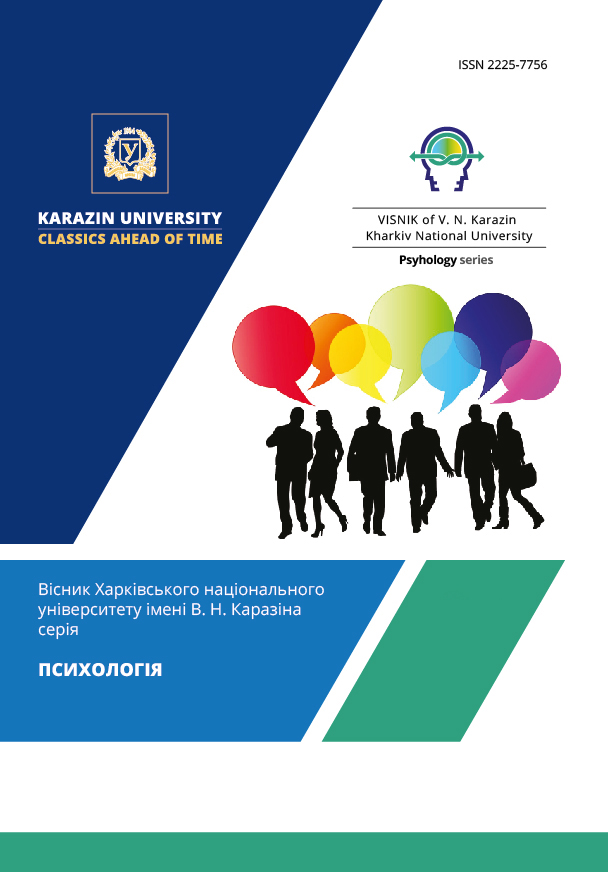Features of the Relationship Between Metacognitive Monitoring and Metacognitive Control
Abstract
The research studies the peculiarities of the relation between metacognitive monitoring and metacognitive control. The study focuses on some theoretical and methodological aspects of the relationship between metacognitive monitoring and control. The article presents an analysis of metacognitive monitoring and control concepts, their distinct functional features, the processes of their functioning, and the peculiarities of the interaction between these components of metacognition. Metacognitive monitoring as a subjective assessment of one's own cognitive processes and knowledge cannot be considered separately from metacognitive control over the strategic regulation of cognitive operations and resources. As a result, metacognitive monitoring processes are an important condition for updating metacognitive control. Thanks to properly organized highly effective metacognitive monitoring, students can at the metacognitive level study cognitive features of knowledge acquisition and use appropriate learning strategies. With the help of metacognitive control, students can use metacognition to regulate their own activities at the cognitive level. The need to study the features of this interaction was due to the importance of continuing the theoretical analysis of the basics of metacognitive monitoring, substantiation of its components, clarifying of the relationship with the effectiveness of educational activities and etc. The results of the theoretical analysis found in the study play a significant role in this relationship understanding. We can assume that the results of the theoretical analysis found in the study play a significant role in the process of understanding such issues.
Downloads
References
Avhustiuk, М. М. (2014). The illusion of knowledge in metacognitive monitoring of the learning process: main aspects and semantic characteristics. Naukovi Zapysky. Seriia “Psykholohiia i Pedahohika”, 26, 3-6. (in Ukrainian). https://eprints.oa.edu.ua/3064/1/Avhustiuk_NZ_Vyp_26.pdf
Balashov, E. M. (2020). Metacognitive monitoring of students' self-regulated learning. [Dys. … PhD in Psycholocial Studies]. Ostroh, 504 p. (in Ukrainian). https://theses.oa.edu.ua/DATA/111/balashov_dis.pdf
Pasichnyk, I., Kalamazh, R., & Avhustiuk. M. (2014). Metacognitive monitoring as a regulatory aspect of metacognition. Naukovi Zapysky. Seriia “Psykholohiia i Pedahohika”, 28, 3-6. (in Ukrainian). http://nbuv.gov.ua/UJRN/Nznuoapp_2014_28_3
Dunlosky, J., & Metcalfe, J. (2009). Metacognition: A textbook for cognitive, educational, life span and applied psychology. USA:SAGE Publications, Inc., 344 p.
Efklides, A. (2009). The role of metacognitive experiences in the learning process. Psicothema, 21(1), 76-82. https://eric.ed.gov/?id=ED602407
Efklides, A. (2014). How does metacognition contribute to the regulation of learning? An integrative approach. Psychological Topics, 23(1), 1-30. https://psycnet.apa.org/record/2014-25618-001
Hӓndel, M., de Bruin, A. B. H., & Dresel, M. (2020). Individual differences in local and global metacognitive judgments. Metacognition and Learning, 15, 51–75. https://doi.org/10.1007/s11409-020-09220-0
Koriat, A. (1997). Monitoring one’s own knowledge during study: A cue-utilization approach to judgments of learning. Journal of Experimental Psychology: General, 126(4), 349–370. https://doi.org/10.1037/0096-3445.126.4.349
Metcalfe, J. (2002). Is study time allocated selectively to a region of proximal learning? Journal of Experimental Psychology. General, 131, 349–363. https://doi.org/10.1037/0096-3445.131.3.349
Nelson, T. O., & Narens, L. (1990). Metamemory: A theoretical framework and new findings. The Psychology of Learning and Motivation, 26, 125-173. https://doi.org/10.1016/S0079-7421(08)60053-5
Ranalli, J. (2018). Inaccurate metacognitive monitoring and its effects on metacognitive control and task outcomes in self-regulated L2 learning. The Electronic Journal for English as a Second Language, 21(4), 1–20. https://lib.dr.iastate.edu/engl_pubs/221
Serra, M. J., & Metcalfe, J. (2009). Effective implementation of metacognition. In D. J. Hacker, J. Dunlosky, A. C. Graesser (Eds.), Handbook of Metacognition and Education. New York, NY: Routledge, 278–298. https://psycnet.apa.org/record/2010-06038-015
Thiede, K. W., Anderson M. C. M., & Therriault D. (2003). Accuracy of metacognitive monitoring affects learning of text. Journal of Educational Psychology, 95(1), 66–73. DOI:10.1037//0022-0663.95.1.66
Valdez, A. (2013). Student metacognitive monitoring: Predicting test achievement from judgment accuracy. International Journal of Higher Education, 2(2), 141–146. DOI:10.5430/ijhe.v2n2p141
Winne, P. H., & Hadwin, A. F. (1998). Studying as self-regulated learning. In D. J. Hacker, J. Dunlosky, A. C. Graesser (Eds.), Metacognition in Educational Theory and Practice, 277–304. https://psycnet.apa.org/record/1998-07283-011




